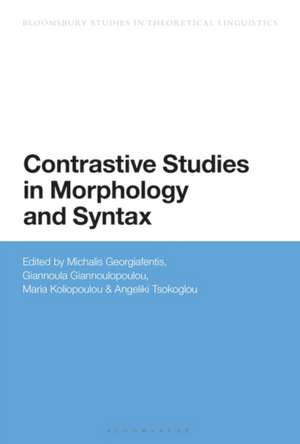Contrastive Studies in Morphology and Syntax: Bloomsbury Studies in Theoretical Linguistics
Editat de Dr Michalis Georgiafentis, Dr Giannoula Giannoulopoulou, Dr Maria Koliopoulou, Dr Angeliki Tsokoglouen Limba Engleză Paperback – 28 iul 2021
| Toate formatele și edițiile | Preț | Express |
|---|---|---|
| Paperback (1) | 219.46 lei 6-8 săpt. | |
| Bloomsbury Publishing – 28 iul 2021 | 219.46 lei 6-8 săpt. | |
| Hardback (1) | 716.96 lei 6-8 săpt. | |
| Bloomsbury Publishing – 22 ian 2020 | 716.96 lei 6-8 săpt. |
Preț: 219.46 lei
Preț vechi: 275.82 lei
-20% Nou
Puncte Express: 329
Preț estimativ în valută:
41.100€ • 45.60$ • 35.28£
41.100€ • 45.60$ • 35.28£
Carte tipărită la comandă
Livrare economică 23 aprilie-07 mai
Preluare comenzi: 021 569.72.76
Specificații
ISBN-13: 9781350273092
ISBN-10: 1350273090
Pagini: 312
Dimensiuni: 156 x 234 mm
Greutate: 0.44 kg
Editura: Bloomsbury Publishing
Colecția Bloomsbury Academic
Seria Bloomsbury Studies in Theoretical Linguistics
Locul publicării:London, United Kingdom
ISBN-10: 1350273090
Pagini: 312
Dimensiuni: 156 x 234 mm
Greutate: 0.44 kg
Editura: Bloomsbury Publishing
Colecția Bloomsbury Academic
Seria Bloomsbury Studies in Theoretical Linguistics
Locul publicării:London, United Kingdom
Caracteristici
Takes a contrastive perspective towards a number of different languages
Notă biografică
Michalis Georgiafentis is Assistant Professor of Linguistics at the Department of English Language and Literature, National and Kapodistrian University of Athens, Greece. Giannoula Giannoulopoulou is Professor of Linguistics at the Department of Italian Language and Literature, National and Kapodistrian University of Athens, Greece. Maria Koliopoulou is Assistant Professor of Linguistics at the Institute of Translation Studies, University of Innsbruck, Austria. Angeliki Tsokoglou is Associate Professor of Linguistics at the Department of German Language and Literature, National and Kapodistrian University of Athens, Greece.
Cuprins
PrefaceIntroduction Part I: Theoretical linguistics from a contrastive point of view1. Heuristic dimensions of contrastive linguistics, Paul Hopper (Carnegie Mellon University, USA) 2. English as a bridge: an L3-approach to contrastive linguistics, Livio Gaeta (Università di Torino, Italy) 3. 'Verb-first' in proverbs and slogans: a German-based, contrastive view, Torsten Leuschner (Ghent University, Belgium) Part II: Morphology4. Gender marking in English and Polish job titles: referring to female physicians, Bozena Cetnarowska (University of Silesia, Poland) 5. Congruence and equivalence in adjective-forming suffixation in Spanish and English: a contrastive study, José Antonio Sánchez Fajardo (University of Alicante, Spain) 6. Linking elements in German compounds: a morphological analysis in comparison with Greek, Maria Koliopoulou (University of Innsbruck, Austria) 7. Compounding in Albanian as a case of 'structural blending': evidence from the contrastive analysis of Greek and Albanian, Asimakis Fliatouras (Democritus University of Thrace, Greece) 8. Past tense usages in tense-rich and tenseless languages: a contrastive study, Masahiko Nose (Shiga University, Japan) Part III: Syntax9. A contrastive analysis of interrogative constructions in Romance: microvariation and theory, Caterina Donati (Université Paris Diderot - Paris 7, France) 10. Wh-questions at the syntax-discourse interface - German-Swedish contrasts, Valéria Molnár (Lund University, Sweden) 11. Focus types: a cross-linguistic study of clause and information structure, Michalis Georgiafentis (National and Kapodistrian University of Athens, Greece) and Angeliki Tsokoglou (National and Kapodistrian University of Athens, Greece) 12. Strong pronouns as postverbal subjects in Spanish and Italian, Manuel Leonetti (University of Alcalá, Spain) and Victoria Escandell-Vidal (National Distance Education University, Spain)13. Cliticisation in Greek: A contrastive examination and cross-linguistic remarks, Anthi Revithiadou (Aristotle University of Thessaloniki, Greece) and Vassilios Spyropoulos (National and Kapodistrian University of Athens, Greece) 14. Possible and impossible borrowings in Asia Minor: towards a formal model of syntactic transfer under contact, Dimitris Michelioudakis (University of York, UK) and Ioanna Sitaridou (University of Cambridge, UK) 15. Goal prevalence and situation types: An empirical analysis of differences in Greek and German motion event descriptions, Thanasis Georgakopoulos (Université de Liège, Belgium) and Holden Härtl (University of Kassel, Germany) Index
Recenzii
For those who want to know how languages differ, this book offers a delightful overview of the current thinking in several fields of grammatical research and different frameworks. An impressive coverage of phenomena, languages and approaches and plenty of insightful reflections about the roots of variation between languages that are seriously relevant for typologists, theoretical linguists and anyone interested in cross-linguistic research.
Taking a contrastive linguistic perspective on a variety of morphological and syntactic phenomena cross-linguistically, this volume brings together fifteen compelling studies by a host of leading scholars. Collectively and individually, they make for fascinating and enlightening reading!
This is an excellent collection of papers that makes a significant contribution to the field of contrastive linguistics ... I find the best aspect of this volume is that most of the papers discuss new data from an alternative perspective that will probably pave the way for future studies with a focus on different languages.
Taking a contrastive linguistic perspective on a variety of morphological and syntactic phenomena cross-linguistically, this volume brings together fifteen compelling studies by a host of leading scholars. Collectively and individually, they make for fascinating and enlightening reading!
This is an excellent collection of papers that makes a significant contribution to the field of contrastive linguistics ... I find the best aspect of this volume is that most of the papers discuss new data from an alternative perspective that will probably pave the way for future studies with a focus on different languages.








